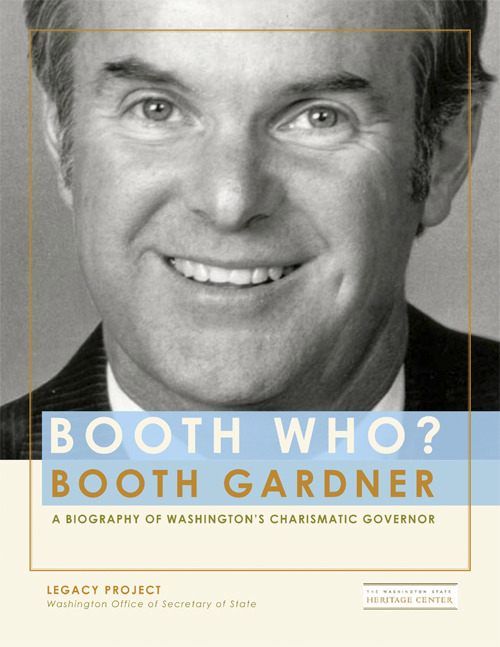Booth Who?, a richly illustrated and anecdote-filled biography of former Governor Booth Gardner, is being published online and in print by the Secretary of State’s Legacy Project this week.
Gardner, an heir to the Weyerhaeuser fortune with a commoner’s touch, has cut a wide swath in Washington’s government, business, higher education, sports and civic activism circles during the last half-century. He was a popular two-term governor, Pierce County Executive, state senator, business leader, soccer coach and inner-city athletic mentor, and a ballot-box activist on issues he cared about. Today, he’s battling the ravages of Parkinson’s disease with characteristic spirit and still hoping to “stay useful” in some way each day.
The 94,000-word, 223-page book, by chief oral historian John C. Hughes, is rich with details from long interviews with Gardner and dozens of his former staff members, friends, relatives, political allies and adversaries. What emerges is a compelling portrait, sometimes brutally honest, of a complex, charismatic man.
Gardner is the 10th extraordinary Washingtonian to be spotlighted by The Legacy Project, the oral history program created in 2008 by the Legislature within the Office of Secretary of State and its planned Washington State Heritage Center. The project, including the scrapbook photographs, is available free online, at sos.wa.gov/legacyproject/oralhistories/BoothGardner/default.aspx. The book version is available via the Legacy Project ($25 for softcover and $35 for a limited edition of the hardbound), at sos.wa.gov/heritage/Donate.aspx.
The book will soon be available at some booksellers. The publication costs were covered by donations, not public dollars.
Earlier projects included the first black and female members of the state Supreme Court, Charles Z. Smith and Carolyn Dimmick, respectively; political journalist Adele Ferguson; Krist Novoselic, rock icon and an elections activist; Robert F. Utter, the Supreme Court justice who quit the bench as an act of conscience over the death penalty; civil rights pioneer Lillian Walker; astronaut Bonnie Dunbar; Nancy Evans, the former first lady and citizen activist; and Jennifer Dunn, former Republican state chair and congresswoman.
Upcoming projects include tribal leader Billy Frank Jr., and Slade Gorton, former three-term attorney general and U.S. senator.
“We are pleased to publish this fascinating account of Booth Gardner’s life and times,” says Secretary of State Sam Reed. “John Hughes has written an unblinking story that captures the former governor’s life so well, the painful and the tragic times as well as the triumphs and his great zest for public life and social justice. Booth Gardner is truly one of a kind and has made a big difference in the life of our state.
“I believe anyone who is fascinated by government and politics, the complexities of family life, and those who just ‘enjoy a good read will enjoy this biography.”
In his book, Hughes writes, “It’s been 17 years since he was Washington’s governor, but everyone still knows his name. In 1983, however, when he decided to challenge a sitting governor, he was little known outside Pierce County where he grew up. His brain trust put “Booth Who?” on a button and it became the catchiest campaign slogan in state history.”
Booth Gardner was handily elected twice and could have had a third term, as one of Washington’s most popular politicians ever. From his first campaign, an upset victory for the State Senate in 1970, to his last, a 2008 landslide that saw Washington become the second state in the nation to allow assisted suicide, Gardner has been a relentlessly analyzed collection of contradictions.
Hughes, who spent a distinguished career in journalism before joining The Legacy Project’s newly reconceived, online-based, oral history program 18 months ago, says the Gardner project was a particularly rewarding opportunity to combine his love of history and writing. Although it was sometimes physically draining for him, Gardner was generous with his time, granting many hours of interviews, opening doors to former colleagues, and revealing many previously untold stories of his life, Hughes says.
Gardner has been battling Parkinson’s disease for 20 years. In fact, he was experiencing its early symptoms during his second term as governor. When he first realized something was wrong, he says he felt like The Tin Man in Wizard of Oz. For Gardner, “Parkinson’s is the last challenge in a remarkable life filled with exultant highs and tragic lows,” Hughes writes.
The Booth Gardner story has deep roots. Digging into the State Library’s trove of genealogical records and unpublished manuscripts, Hughes discovered that Washington’s 19th governor is the descendant of Oregon Trail pioneers who came to the Oregon Country a half century before Washington statehood in 1889. Gardner’s great-grandmother walked most of the way from Missouri to Oregon — 2,000 miles. His great-grandfather was elected King County auditor in 1874, and his grandfather helped save the King County Courthouse in the great Seattle fire of 1889. Booth’s great-uncle was once part-owner of the Seattle Post-Intelligencer and dubbed Washington “The Evergreen State.”
“Growing up, Booth had heard the stories about his grandfather’s derring-do,” Hughes says, “but he wasn’t sure how much was fact and how much was fiction. He was stunned to learn that the truth was more wonderful than he’d ever imagined and pleased that his grandchildren stand to learn so much about the history of their state. That’s really what The Legacy Project is all about — capturing history and making it come alive.”







